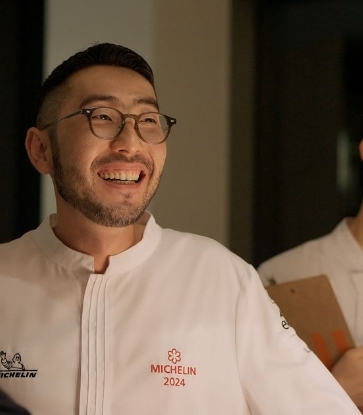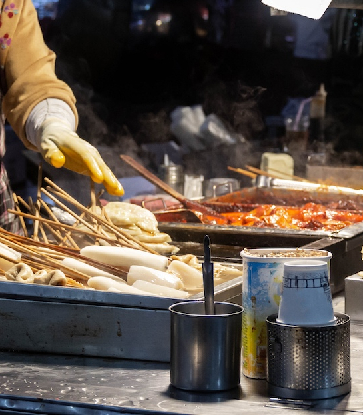After countless “trials and errors” since founding Restaurant On five years ago, Chef Kim Jun-hyung can count himself among the small echelon of chefs who have been awarded the 2023 MICHELIN Seoul Young Chef Award. As a testimony of Kim’s pursuit of the highest standards when it comes to traditional French cuisine with a focus on the genuine taste of ingredients, MICHELIN Seoul has named him the recipient of this year’s Young Chef Award, sponsored by Blancpain.
Blancpain has been a faithful companion of time for over 300 years since its establishment in 1735 and a global partner of the MICHELIN Guide.
Blancpain Brand Manager Choi Won-ho said, “We, Blancpain and MICHELIN have maintained an exceptional relationship. In particular, under the motto of ‘Art of Living,' we support craftsmanship and respect for tradition, creativity, and excellence in gastronomy. Congratulations to chef Kim Jun-hyung, who was selected as a Young Chef in the MICHELIN Guide Seoul 2023, and we look forward to seeing your endless growth and development in 2023. We ask for your support so that the next year will be a successful year for both Blancpain Korea and him.”
We ask chef Kim to share more about his journey and what to expect at Restaurant On when dining there in the future.

Congratulations on winning the 2023 MICHELIN Seoul Young Chef Award. Who did you share your joy with after receiving this award?
I called my parents first. Until I opened the restaurant, they were worried about me a lot. Even at this moment, I can’t stop thinking about their support and love for me. I also contacted Onjieum's chef Cho Eun-hee and chef Park Sung-bae.
The Young Chef Award is often called a ‘once-in-a-lifetime award’. How did you feel when your name was announced?
Every moment from the day the restaurant opened went through my mind. The first year was really difficult. I was so stressed that I even had nightmares of doing service and woke up in the middle of the night in a sweat. However, after 5 years, the time that seemed like walking in a fog passed, and I finally felt that I had arrived today.
Restaurant On is a very small restaurant with only two tables. It's not a typical type of restaurant. Was it your goal to open a small restaurant from the beginning?
I apprenticed in the Marea while working for the CIA. I cooked every day, but the fact that I don't know who eats the food I make or how they react to it was frustrating. Guests spend about two hours in the restaurant, but in fact, for that short time, the chefs spend at least 10 hours in the kitchen from morning to evening. In order to deliver that time and effort to the guests in the most sincere way, I think the chef should take the lead beyond the kitchen wall. I believe that food can become more delectable when you can understand the guest's emotions and communicate with customers.
How do you describe the cuisine you present?
It’s not flashy. When it comes to classic French, many people probably think of a heavy flavor embellished by butter, but my definition of classic French is actually a kind of cuisine that takes time and effort without compromise, rather than taste. That's why I reduce the amount of butter used when cooking or add rhythm to the course by adjusting the menu, but I try not to compromise on basic parts such as broth and sauce.
Is there a dish that best shows your definition of ‘classic French’?
The sauce called jus de veau, which I spend the most time preparing, represents what I think of as 'classic French'. To make this sauce, I roast a beef bone and simmer it for three days, add mirepoix, reduce it in half again, add wine to it and boil it slowly to come together. Those who see the whole process ask if all the hard work is really necessary. And also tell me that using a pressure cooker or skipping some steps will reduce the preparation time. But that's the way I've been taught, so I keep it.
Are there any memorable guests?
Our restaurant’s guests are slightly older than at other fine dining restaurants. All of them have been enjoying gourmet food all their lives, so they have delicate tastes. That's why I'm more nervous than usual on days when these experienced customers come over.
One time, an elderly gentleman visited and called me in the middle of the course. He asked what the next course was, and I replied, “lobster,” and I still remember the soft reply he gave. “I’m not a big fan of lobster, but I’m looking forward to the lobster dish that you make.” It was overwhelming that I could give that much trust through food.
Though it is a bit boring to say, I think that's the reward of being a chef. The salary as a chef is not high, and the work intensity is not low, but thanks to the fact that customers are not stingy with compliments, I was able to come this far. The reward I feel from a word of recognition from guests is the most precious thing in my life.
Is there anything you would like to say to young chefs?
I think it's important not to give up. It may be a series of repetitive tasks, but you have to do it with the mindset of doing one thing more than yesterday. Even though your skill doesn't seem to be improving, your skills will be getting better little by little.
I am a person who still needs to grow. Restaurant On is not a completed restaurant. There are still many areas that need to be improved. Let's work together for the change that comes from incremental improvements day by day.
This article is edited by June Lee in English



















